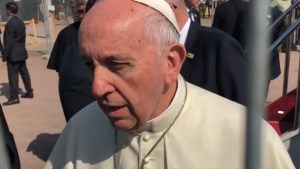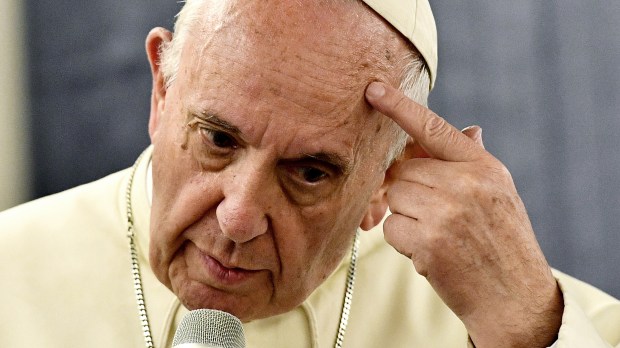On his return to Rome from Chile and Peru, Pope Francis spoke with the press about a few-minute episode that caused an international stir.
A bishop in Chile is embroiled in controversy because he is accused of covering up abuse by a former priest. The bishop, Juan Barros, was in 2015 assigned to a new diocese, Osorno, where he has met opposition.
On the pope’s last day in Chile, during his visit to Iquique, which is a diocese where Barros was formerly the bishop, a reporter asked the pope about the case.
The pope responded briefly, and concluded with: “There is not a single bit of proof against him; all of it is calumny.”
Certain news outlets headlined the pope’s response saying that the pope was accusing sex abuse victims of slander.
In the in-flight press conference, the pope took the chance to speak about the case in-depth, and asked forgiveness of victims for having hurt them: “I ask your forgiveness because I hurt you without realizing it. It’s a wound I didn’t want.”

Read more:
Pope says there’s no proof against Chilean bishop, accusations are slander
Here is a transcription and translation of a portion of what he said:
I understand the question, that’s perfect. About Barros, I made only one statement. I spoke in Chile, and that was in Iquique, at the end. I spoke twice in Chile about cases of abuse, very forcefully, in front of the government (which meant speaking before the nation), and in the Cathedral with the priests. The speech I gave to the priests is what I feel most deeply regarding this case. You know that Pope Benedict started with zero tolerance. I continued with zero tolerance, and after nearly five years of pontificate, I haven’t signed a request for pardon.
This is how the processes work: they enter the Congregation for the Doctrine of the Faith, and the Congregation issues a sentence—in cases of removal from the clerical state, the sentence is definitive at the first instance level. The condemned person has the right to appeal; there is an appeals (second instance) court. The appeals court knows that if there is clear evidence of abuse, there is no room for appeal; that isn’t appealed. What can be appealed are procedures, errors of procedure, irregularities… in that case, there has to be a review of the proceedings… as in every court.
If the appeals court confirms the first tribunal’s decision, the person has only one way out left, and that is to appeal to the Pope for pardon. In five years, I must have received, I don’t know the number, 20-25 cases where they decided to ask for pardon; I didn’t sign any. Just in one case, which wasn’t a pardon or anything, it was a discussion of juridical sentencing, during my first year of pontificate, and I saw there were two sentences: one very serious one that came from the diocese, and another issued by the Doctrine of the Faith.
The sentence from the Doctrine of the Faith was the heavier of the two. The one that came from the diocese was very serious, with great caution and a lot of conditions. In other words, “With these conditions we need to wait a while and see what…” That is to say, it didn’t close the case. As one must always do in good jurisprudence, always to the benefit of the accused. I chose the lighter sentence with the conditions. Two years later it was judged that the conditions hadn’t been met, and so I let the other sentence go into effect. It was the only case where I doubted, but [only] because there were two sentences and there is a legal principle “in dubio pro reo” [“the benefit of the doubt goes to the accused”] and so I chose that option. That’s my stance.
Now, the case of Bishop Barros. It’s a case that I had studied, I had it investigated, I made them work a lot, and really there is no evidence; I use the word “evidence” because later I’m going to talk about proof. There is no evidence. Later I’ll talk about proof. There is no evidence of culpability; or rather, it seems that none will be found, because there is coherence in a different way. Based on the fact that there is no evidence, I am waiting for evidence in order to change my stance; if not, I apply the basic legal principle in every court: ‘nemo malus nisi probetur,’ no one is bad unless it’s proven.
And there’s the word “proof” which I think is the one that played a bad trick on me. I said, in Spanish, as far as I remember—I was entering, and a journalist from Iquique asked me, “We in Chile have a big problem with Bishop Barros. What do you think?” and I think these are the words I said. First, I thought, do I answer or not? And I said [to myself], “yes,” because Barros had been the bishop of Iquique, and one of the people of his diocese was asking me, and has the right. And I said, “The day there is proof, I will speak.” I think I said, “I have no proof.” I think so, but I don’t remember, but it’s recorded; you can find it.
The answer was given: the day I have proof, I’ll speak. The word “proof” is what betrayed me and created confusion. I’d rather speak of evidence. And of course, then, I know that there are many people who were abused and who cannot bring proof; they don’t have it. And who cannot, or sometimes they have proof but they are ashamed, they cover it up and suffer in silence. The drama of those who have been abused is tremendous, tremendous. Two months ago, I met with a woman who was abused 40 years ago. She’s married, with three children. That woman hadn’t received Communion since that time, because in the hand of the priest she saw the hand of an abuser. She couldn’t draw near. And she was a believer, she was Catholic. She couldn’t. (Forgive me for continuing to speak in Spanish, but I want to be precise with the Chileans.)
The word “proof” wasn’t the best one for drawing close to a wounded heart. “Evidence” would be a better word. The Barros case was studied, and studied again, and there is no evidence. That’s what I meant to say. I have no evidence to condemn him. And in that case, if I condemned him without evidence or without moral certainty, I would commit the crime of being a bad judge.
There’s something else I want to say. And I’m going to explain this in Italian. One of you came up to me and told me, “I saw the letter that went out,” and he showed me a letter that I wrote two years ago, when the Barros problem was beginning. I have to explain that letter, because it is actually a letter in favor of prudence regarding how the Barros problem has been handled. That letter isn’t the narration of a brief event; it’s a narration of more or less 10-12 months.
When the Karadima scandal exploded, a man… we all know what his scandal was, it began to come to light how many priests that were formed by Karadima were abused or were abusers. In Chile, there are four bishops that Karadima sent to the seminary. One person in the Episcopal Conference suggested that these bishops—three, because the fourth was very ill, and wasn’t in charge of a diocese, but three were at the head of diocese— if maybe it would be better if these bishops resigned, handed in their resignation, or took a sabbatical year, and afterwards, when the storm had passed…, to avoid accusations, because they are good bishops, good ones. And since Barros had already been a bishop for 20 years, he was about to end his term as a military bishop… first, he was an auxiliary bishop of Valparaíso, then bishop of Iquique, then bishop for the military for nearly 10 years. He has been a bishop for nearly 20 years. Maybe we asked for his renunciation, and he generously gave it. He came to Rome, and I said “no,” we can’t play that way because that’s admitting to guilt in advance. And in any case, if they are guilty, there’s an investigation. And I stopped him [from resigning].
When he was named [to his current diocese] and this whole protest movement continued on, he offered his resignation a second time, and I said “no,” you’re going. I spoke with him for a long time. Others spoke with him for a long time. And, “you continue.” And you know what happened on the day he took possession and all that. Barros continued to be investigated, and no evidence appeared. And this is what I meant to say: I can’t condemn him, because I don’t have evidence—although I’m convinced he is innocent.
Moving on to a third point: how do the abuse victims feel? And with this, I must ask for forgiveness, because the word “proof” hurt them, it hurt many abuse victims: “Ah, I have to go look for evidence of this?” No. It’s a word translating the legal principle, it has hurt… And I ask your forgiveness because I hurt you without realizing it. It’s a wound I didn’t want. And this is very painful for me, because I meet with these people… I received them in Chile… Two are publicly known, and there were others who were more hidden. Not in Peru. During every trip, the possibility exists. The ones in Philadelphia have been published, and another three were published. Other cases weren’t. I know how much they suffer. Feeling that the pope says to their face, “give me a letter with proof,” is like a slap in the face. Now I realize that the expression I used wasn’t the right one, because I didn’t think of that. And I understand, as the Apostle Peter says in one of his letters, it has caused a fire. And this is what I can sincerely say. Barros will remain there if I don’t find any way to condemn him. I cannot condemn him if I don’t have evidence. And there are many ways to provide evidence.
They tell me that after the turbulence of Barros and of the Sodalicio we will have a meteor shower. I would stay here.
In the Barros case, there is no evidence. Perhaps he began with that bad decision to resign, and he began to be accused. But there is no evidence of abuse.
A second question from the reporter: “on covering up abuse?”
Right, right, but that’s abuse too, isn’t it? Covering up abuse is an abuse. No, there is no evidence. For this reason, the best thing is for those who believe things are that way, to provide evidence quickly. If you honestly think that’s the way things are. I, right now, don’t believe it to be the case, because there is no evidence. But my heart is open to receive it.
The pope also referenced a statement from Boston’s Cardinal O’Malley, released in response to the pope’s initial comments
I’ve thought about what Cardinal O’Malley said; I thank him for that statement, because it was very fair. What he said is everything that I have done and do and that the Church does.

